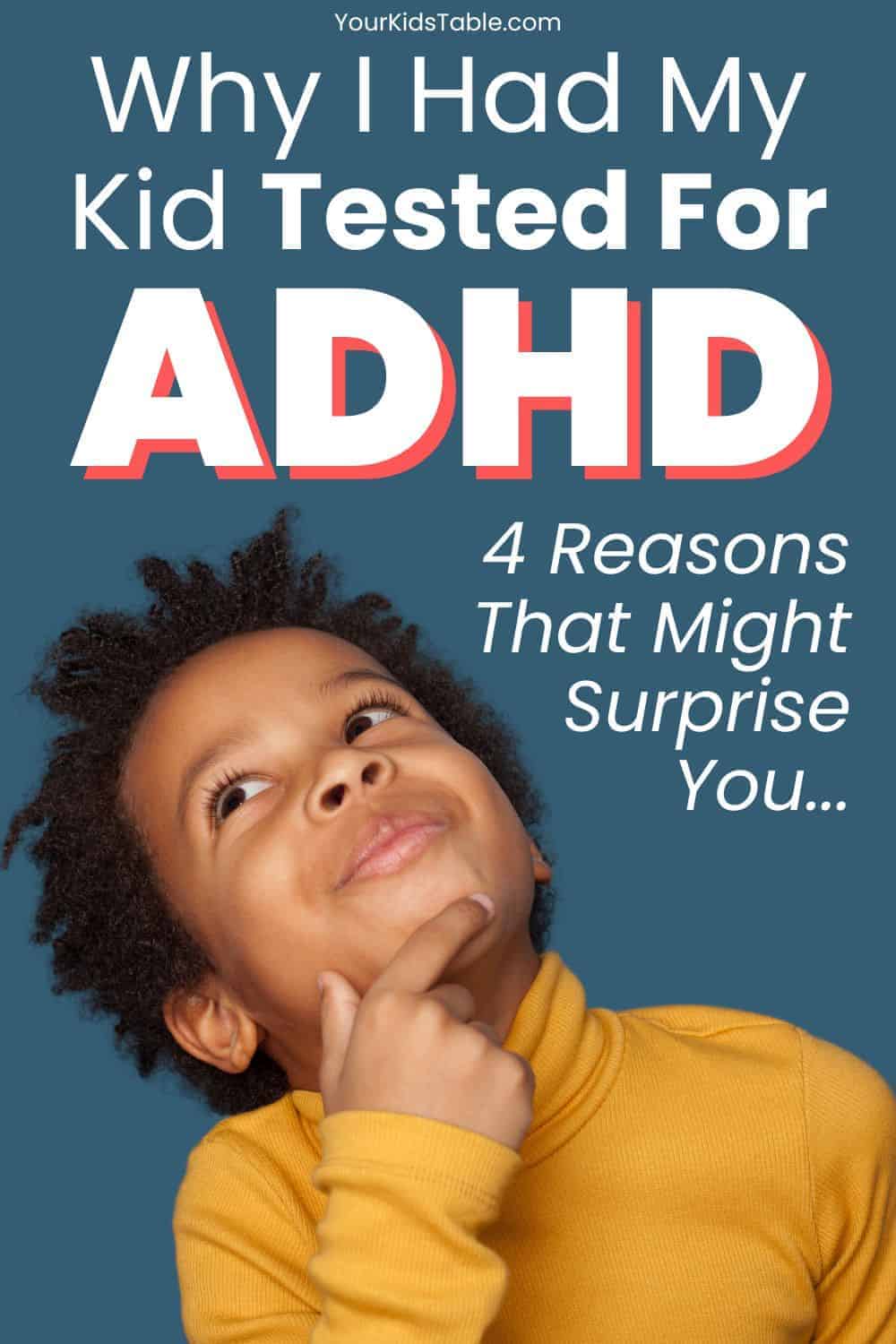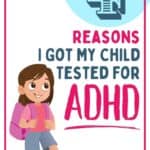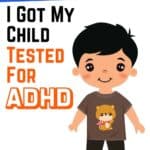Learn 4 reasons I evaluated my son for ADHD, as well as the benefits of getting a diagnosis. Personal perspective from an OT and mom.
Recently one of my sons received an ADHD diagnosis, and I have to be honest with you- It would have been really easy to not get him tested for ADHD.
I spent some time thinking, “Does he need this diagnosis? Is it going to benefit him? Why are we getting him diagnosed?”
I think that when our kids are able to push through and function in some capacity, even if they need our help, even if we’re hearing from teachers, or maybe you’re just seeing the difficulties at home, as was in our case, it can be very easy to say,
“I’m not going to get them evaluated because I don’t want them to have a label.”
“I don’t want others to look at them and think that they understand who my child is just because they also have this diagnosis.”
“I don’t don’t want this diagnosis to follow them for the rest of their lives.”
If you have ever said this about your child, I understand.
I, as a pediatric occupational therapist, have worked with countless families who have kind of wrestled with these questions and wondered if it really worth getting a child evaluated.
Especially if one or both parents feel strongly that they don’t want to use medication.
Well I want to tell you ultimately why we decided to get my son evaluated, and I am so glad that we did.
4 Reasons Getting a Diagnosis Can Be a Good Thing
The first reason is that I knew that a diagnosis was going to help us understand his needs in a different way.
Instead of looking at the things that he did on a daily basis that frustrated, that wore me and my husband down, that literally had us banging our heads against the wall wondering if we were raising a child with poor character.
And because there was such a lack of impulse control and poor attention, that sometimes seemed to translate into just this abrupt rudeness from him.
Without the diagnosis, I worried that we would only see him through this lens, perhaps subconsciously comparing him to his brothers because we weren’t understanding that part of that diagnosis is a real difficulty with executive functioning skills.
Having the diagnosis helped us understand and have compassion for him.
The second reason, though, was so that he would understand himself better so that he did not feel like there was something wrong with him.
Because children with ADHD and other other diagnoses that can fly under the radar, which can be autism in some children, as well sometimes mental health diagnoses, start to feel like something is wrong with them.
They feel the frustration from the adults around them in their life, whether that’s teachers or parents or family members, because they’re not acting in the way that we expect them to.
They also can feel the struggle in tasks, whether that’s in social situations or learning, when they cannot attend. They start to see that other children around them aren’t able to do things, and aren’t being corrected or redirected as often as they are.
And I really believed that if we found out that my son did in fact have ADHD that it would empower him and help him to understand that there is nothing wrong with him but that a certain part of his brain has some difficulty and that is what the difference is.
And that leads us to our third point which is that I knew that this would allow him to advocate for his needs.
Recently, as we are working on developing strategies, I suggested to him, “Why don’t you check in with your teacher on the way out of the classroom just to make sure that you have jotted down the homework correctly,” because sometimes he doesn’t.
As a result of his ADHD, when the directions are being given, he has a hard time tracking if it’s multiple steps, and he may have drifted off and not been paying attention and then he leaves the class with a very vague sense of exactly what it is he is supposed to be doing.
So this seemed like a simple suggestion and it broke my heart when he said to me, “I can’t do that because they will ask me why I wasn’t paying attention” and I realized that he was right.
But when he has this ADHD diagnosis he can say to an adult, “I have ADHD and I struggle with attention.” Moreover, I as the parent can let the school know, “Hey, he has this struggle, we are working on supporting him.”
Right now, we want him to be as independent as possible, but he has to take the steps in building those skills first. That diagnosis allows us to advocate for his needs.
And number four, it’s for the future.
If at some point school gets so difficult that he needs extra support, he needs a 504 or an IEP plan, which he does not at the moment. I wanted that diagnosis in place because with it I can get the support way more quickly than if I go then and start the evaluation process.
Depending on where you live and the availability around you, this could take up to a year to get an evaluation.
So I wanted to have that before we were in a critical state so that if and when, and hopefully he doesn’t, but if he does need additional support he is able to get them because we have that diagnosis in place.
So I just want to encourage you today, that if you are struggling and wrestling with “should I or shouldn’t I?”
I know it’s a big decision, but there are many positive reasons to get a diagnosis.
And today we are taking so many strides in our culture to celebrate neurodiversity and the language that we are using collectively is changing.
I have a friend who will say when they are not paying attention in a conversation “Wait wait wait I’m so sorry that was the ADHD, can you kind of say that to me again?”
And it’s not a strange thing to hear.
We have high numbers of kids with ADHD and anxiety and even autism, so making this a part of our daily life is a good thing and it’s changing!
Having those diagnoses today does not mean what it did 10 years ago or even five years ago.
So I would love to hear what you think. Leave a comment below this video, and let us know if you are struggling or need some help or encouragement on if you should get your child diagnosed.
Or if you have already done so and you’ve had some benefits, we would love to hear those too. Thanks so much for listening. I’m so so grateful for you!
More Help For Kids with ADHD and Poor Attention
So many kids struggle with attention, impulsivity, and other executive functioning skills. This is common for kids with ADHD, Autism, and other developmental diagnoses. However, some kids have poor executive functioning and have no diagnosis.
The first step to helping them is to make sure their sensory system is regulated, calm, balanced. To do that you’ve got to address the sensory system.
Executive functioning and the sensory system are closely linked. To get start with some regulating activities grab our printable of 25+ Sensory Activities here and we’ll send it right to your inbox.
Did you pin this?
Keep Exploring the Blog with These Helpful Articles:
Sensory Self Regulation: A Critical Skill for Kids with Sensory “Issues”
Occupational Therapy for Autism: How Does it Help?
Everything You Need to Know About Feeding Therapy
What is Pediatric Feeding Disorder (PFD)? A Diagnosis for Extreme Picky Eaters
Alisha Grogan is a licensed occupational therapist and founder of Your Kid’s Table. She has over 19 years experience with expertise in sensory processing and feeding development in babies, toddlers, and children. Alisha also has 3 boys of her own at home. Learn more about her here.



Thank you so much for sharing this info about your son, and yourself. I was in this position many years ago with my son who was in the 7th grade.
Your description of the behaviors and teachers responses sounds so familiar.
There was ( and still is, but it’s improving!) such a lack of understanding about what ADHD is. It has always had a negative stigma attached to it for whatever reason and that has gotten in the way of children and parents getting the support they need.
It’s not a bad thing! The brain just works in a different way but it has nothing at all to do with one’s intelligence. It’s so much more than perceived “ hyperactivity” or lack of attention” which is what the majority believe. It’s actually pretty fascinating and finding out more about what it is and isn’t is truly empowering.
I wasn’t diagnosed until I was 56. It’s been eye opening and I continue to learn more about it and myself everyday. I wish I had known when I was much younger! It would have allowed me to learn different ways to get things done, study and complete assignments more efficiently, advocate for test accommodations or time extensions and structured outlines for big assignments or projects, all of which I was very capable of doing well— I just spent way more time and energy doing them, feeling frustrated not understanding why, all of which can lead to negative self talk and damage confidence and self esteem.
Wow, Christy, what a valuable perspective! Thanks for sharing. It’s so true, seeing a diagnosis as an empowering and helpful piece of self understanding is huge. The hope is that a generation of kids and their families can better understand how their brains are wired, what supports they need, and how to confidently convey these needs to others. You’re so right that ADHD is complex, and way more than attention. We are glad you’re here, and how incredible that at 56 you could learn and important piece about who you are.
Best,
Laura
Your Kid’s Table team member
My husband and I have been going through the exact mental struggles you describe, each bringing a different perspective, so I appreciate your insights. But I have to be honest, the most encouraging thing about this video is hearing that you, a professional in this field, also feel worn down. That you are seeking outside help for thoughtful reasons rather than trying to push through on your own. Thank you for being open.
I am the grandmother of an almost 6 yr old boy. And also a retired school based OT. Got some very important info from this video. Thank you! My daughter has had her son evaluated at school & currently he has an exceptionality of ED. She is going to his pediatrician when he is 6 thinking he is actually ADHD (we all think that). I am encouraging her to take him to a group of therapists (OT, PT, Speech) who provide services to kids with varying diagnoses for outside therapy since schools can’t provide it all. Am also going to check out the book you recommended.
Carolyn, I am so glad you’re here! How cool you are a retired OT! Your family is so lucky to have you as a resource and advocate. Let us know how things go, and keep it up! Thanks for reading and sharing!
Best,
Laura
Your Kid’s Table team member
Where did you go to get the testing done?
Hi Karla,
Depending on what resources are available where you live, typically a neuropsychologist or a developmental psychologist/pediatrician will do this assessment. Sometimes there are ADHD specific centers, but your pediatrician should be able to make a recommendation on where to refer if you are interested in seeking an evaluation for your child.
Best,
Laura
Your Kid’s Table team member
What is a good age to get diagnosis? I think if I did it for my 9 year old he would use it as an excuse all the time. Right now things are ok and we work with executive function coach to help with some of the areas of improvement.
Hi Danielle,
It all comes down to if things are being impacted in a negative way and if the diagnosis would be helpful or not. From what you said, it sounds like things right now are going well, so it isn’t necessary. The one thing to keep in mind is that sometimes that assessment process can have incredibly long wait lists, so if it comes to being a necessity for school, keep this in mind. Thank you for reading and sharing!
Best,
Laura
Your Kid’s Table team member
We also recently had our son diagnosed with ADHD. One of the most compelling reasons given to me was – if you don’t get the right ‘label’, then someone else (teachers, other kids) will give him an incorrect label, like naughty, rude, inattentive, dumb. This way he can be correctly informed about the differences in his brain and the impact that they have.
Yes! That’s so true! Most people don’t understand ADHD, or the fact that any behavior, regardless of whether there is a diagnosis, is a form of communication and should be considered more thoughtfully or children are judged and labeled in correctly.
This is very good insight and so true! There is a common theme for these kids getting labeled incorrectly and judgmentally, and when we give them appropriate means to understand themselves and advocate, it is very empowering to them.
Thanks for sharing!
Best,
Laura
Your Kid’s Table team member
Hi Hanna,
This is absolutely true and such good insight. It is heartbreaking that so many kids get labeled this way, but you’re right- giving them an appropriate “label” allows them to advocate for themselves better!
Best,
Laura
Your Kid’s Table team member